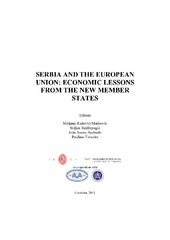Corporate Social Responsibility as a Tool for Smart, Sustainable and Inclusive Growth
2011
Аутори
Radovanović, Bojana
Brković, Filip
Stevanović, Slavica
Остала ауторства
Radović-Marković, MirjanaRedžepagić, Srđan
Sousa Andrade, João
Teixeira, Paulino
Поглавље у монографији (Објављена верзија)

Метаподаци
Приказ свих података о документуАпстракт
The recently adopted Strategy for the economic and social development of the EU
- Europe Strategy 2020, recognizes the concept of the Corporate Social
Responsibility (CSR) as one of the tools for the achievement of a smart,
sustainable and inclusive growth. Although the integration of CSR concept into
business strategies is made on voluntary bases, governments, civil sector, media
and academia have an important role in its promotion. The aim of this paper is to
analyse the role that CSR plays in the socio-economic development focusing on
Serbia. While the Government perceives the importance of CSR for Serbian socioeconomic
development, it is noticeable that pressure on companies to undertake
socially responsible activities made by media, NGOs, consumers and business
partners is not remarkable. In addition, the business community still does not
have enough CSR initiatives that would be both beneficial to the community and
profitable for companies. The paper argues that educa...tion on CSR of the
managers and the broader public is essential in raising the awareness of the
benefits that CSR offer. Consequently, it would lead towards the wider
implementation of CSR in Serbia.
Кључне речи:
Europe 2020 / corporate social responsibility (CSR) / stakeholder theory / SerbiaИзвор:
Serbia and the European Union: Economic Lessons from the New Member States, 2011, 396-406Издавач:
- Coimbra : Faculty of Economics of the University of Coimbra
- Belgrade : Institute of Economic Sciences
- Belgrade : Belgrade Banking Academy
Финансирање / пројекти:
- Изазови и перспективе структурних промена у Србији: стратешки правци економског развоја и усклађивања са захтевима ЕУ (RS-MESTD-Basic Research (BR or ON)-179015)
- Европске интеграције и друштвено-економске промене привреде Србије на путу ка ЕУ (RS-MESTD-Integrated and Interdisciplinary Research (IIR or III)-47009)
URI
http://www.library.ien.bg.ac.rs/index.php/zb/article/download/470/423http://rifdt.instifdt.bg.ac.rs/123456789/1522
Колекције
Институција/група
IFDTTY - CHAP AU - Radovanović, Bojana AU - Brković, Filip AU - Stevanović, Slavica PY - 2011 UR - http://www.library.ien.bg.ac.rs/index.php/zb/article/download/470/423 UR - http://rifdt.instifdt.bg.ac.rs/123456789/1522 AB - The recently adopted Strategy for the economic and social development of the EU - Europe Strategy 2020, recognizes the concept of the Corporate Social Responsibility (CSR) as one of the tools for the achievement of a smart, sustainable and inclusive growth. Although the integration of CSR concept into business strategies is made on voluntary bases, governments, civil sector, media and academia have an important role in its promotion. The aim of this paper is to analyse the role that CSR plays in the socio-economic development focusing on Serbia. While the Government perceives the importance of CSR for Serbian socioeconomic development, it is noticeable that pressure on companies to undertake socially responsible activities made by media, NGOs, consumers and business partners is not remarkable. In addition, the business community still does not have enough CSR initiatives that would be both beneficial to the community and profitable for companies. The paper argues that education on CSR of the managers and the broader public is essential in raising the awareness of the benefits that CSR offer. Consequently, it would lead towards the wider implementation of CSR in Serbia. PB - Coimbra : Faculty of Economics of the University of Coimbra PB - Belgrade : Institute of Economic Sciences PB - Belgrade : Belgrade Banking Academy T2 - Serbia and the European Union: Economic Lessons from the New Member States T1 - Corporate Social Responsibility as a Tool for Smart, Sustainable and Inclusive Growth SP - 396 EP - 406 UR - https://hdl.handle.net/21.15107/rcub_rifdt_1522 ER -
@inbook{
author = "Radovanović, Bojana and Brković, Filip and Stevanović, Slavica",
year = "2011",
abstract = "The recently adopted Strategy for the economic and social development of the EU
- Europe Strategy 2020, recognizes the concept of the Corporate Social
Responsibility (CSR) as one of the tools for the achievement of a smart,
sustainable and inclusive growth. Although the integration of CSR concept into
business strategies is made on voluntary bases, governments, civil sector, media
and academia have an important role in its promotion. The aim of this paper is to
analyse the role that CSR plays in the socio-economic development focusing on
Serbia. While the Government perceives the importance of CSR for Serbian socioeconomic
development, it is noticeable that pressure on companies to undertake
socially responsible activities made by media, NGOs, consumers and business
partners is not remarkable. In addition, the business community still does not
have enough CSR initiatives that would be both beneficial to the community and
profitable for companies. The paper argues that education on CSR of the
managers and the broader public is essential in raising the awareness of the
benefits that CSR offer. Consequently, it would lead towards the wider
implementation of CSR in Serbia.",
publisher = "Coimbra : Faculty of Economics of the University of Coimbra, Belgrade : Institute of Economic Sciences, Belgrade : Belgrade Banking Academy",
journal = "Serbia and the European Union: Economic Lessons from the New Member States",
booktitle = "Corporate Social Responsibility as a Tool for Smart, Sustainable and Inclusive Growth",
pages = "396-406",
url = "https://hdl.handle.net/21.15107/rcub_rifdt_1522"
}
Radovanović, B., Brković, F.,& Stevanović, S.. (2011). Corporate Social Responsibility as a Tool for Smart, Sustainable and Inclusive Growth. in Serbia and the European Union: Economic Lessons from the New Member States Coimbra : Faculty of Economics of the University of Coimbra., 396-406. https://hdl.handle.net/21.15107/rcub_rifdt_1522
Radovanović B, Brković F, Stevanović S. Corporate Social Responsibility as a Tool for Smart, Sustainable and Inclusive Growth. in Serbia and the European Union: Economic Lessons from the New Member States. 2011;:396-406. https://hdl.handle.net/21.15107/rcub_rifdt_1522 .
Radovanović, Bojana, Brković, Filip, Stevanović, Slavica, "Corporate Social Responsibility as a Tool for Smart, Sustainable and Inclusive Growth" in Serbia and the European Union: Economic Lessons from the New Member States (2011):396-406, https://hdl.handle.net/21.15107/rcub_rifdt_1522 .

